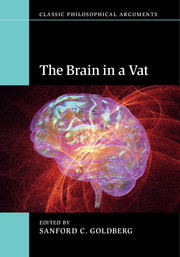Book contents
- Frontmatter
- Contents
- List of contributors
- Acknowledgments
- 1 Introduction: Putnam's reflections on the brain in a vat
- Part I Intentionality and the philosophy of mind and language
- Part II Epistemology
- Part III Metaphysics
- 9 Brains in vats and model theory
- 10 Realism, skepticism, and the brain in a vat
- 11 Rethinking semantic naturalism
- 12 Internal to what? Contemporary naturalism and Putnam's model-theoretic argument
- 13 The model-theoretic argument: from skepticism to a new understanding
- 14 Eligibility and ideology in the vat
- Bibliography
- Index
13 - The model-theoretic argument: from skepticism to a new understanding
from Part III - Metaphysics
Published online by Cambridge University Press: 05 June 2016
- Frontmatter
- Contents
- List of contributors
- Acknowledgments
- 1 Introduction: Putnam's reflections on the brain in a vat
- Part I Intentionality and the philosophy of mind and language
- Part II Epistemology
- Part III Metaphysics
- 9 Brains in vats and model theory
- 10 Realism, skepticism, and the brain in a vat
- 11 Rethinking semantic naturalism
- 12 Internal to what? Contemporary naturalism and Putnam's model-theoretic argument
- 13 The model-theoretic argument: from skepticism to a new understanding
- 14 Eligibility and ideology in the vat
- Bibliography
- Index
Summary
Two well-known arguments by Putnam, the one skeptical (Putnam 1980), the other anti-skeptical (Putnam 1981b), are the “model-theoretic argument” (henceforth, MT) and “brains-in-a-vat argument” (henceforth, BIV). The MT argument shows, according to Putnam, that (i) we cannot theoretically determine the reference of our words, and that, as a result, (ii) we must renounce the correspondence theory of truth and robust realism. The BIV argument shows, Putnam says, that (iii) we cannot truly believe that we are BIVs, and that (iv) Cartesian skepticism is thus undermined.
Three questions naturally arise: (a) Is there a conflict between Putnam's skeptical and anti-skeptical conclusions? In particular: Given that the key to (iii) is Putnam's claim that we, unlike BIVs, have referential access to the world, is there a conflict between his claims about referential access in the two arguments? (b) Is Putnam's skeptical conclusion concerning truth and realism warranted? (c) What is the philosophical significance of the BIV thought experiment?
The answer to the first, more general, part of the first question appears to be negative. If we understand BIV as arguing against an especially extreme form of skepticism, Cartesian or Evil-Demon skepticism, and MT as arguing for a weaker form of skepticism, correspondence-truth skepticism or robust-realism skepticism, there need not be a general conflict between them. However, some ideas developed in recent articles about Putnam's BIV (see e.g. Tymoczko 1989a, b; A. W. Moore 2011) suggest to me that on some level there might be a conflict between the two arguments. The answer to the second, more specific, part of the first question depends on whether the referential access denied by MT is of the same kind as that affirmed by BIV. But the first question is not one I will focus on in this chapter. The questions I will focus on are the second and the third questions. I will offer new challenges to Putnam's skepticism with respect to robust truth and realism, and I will raise a new philosophical question about BIVs (and us).
The chapter is divided into four sections. In Section 13.1 I will challenge Putnam's MT-skepticism on the ground that it is based on a mistaken understanding of Tarskian models. In Section 13.2 I will discuss Putnam's skeptical permutation-argument. In Section 13.3 I will question Putnam's understanding of robust correspondence and realism.
- Type
- Chapter
- Information
- The Brain in a Vat , pp. 208 - 225Publisher: Cambridge University PressPrint publication year: 2016

